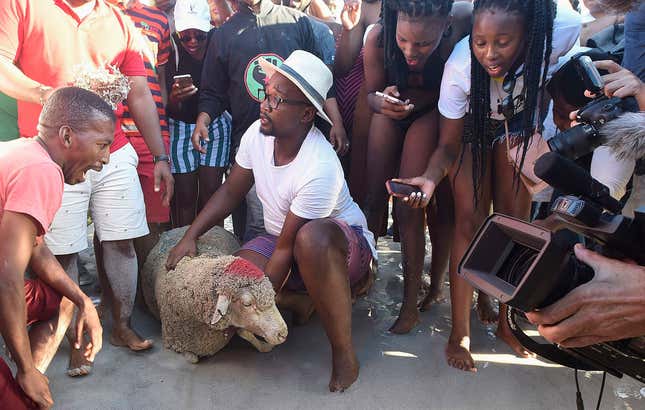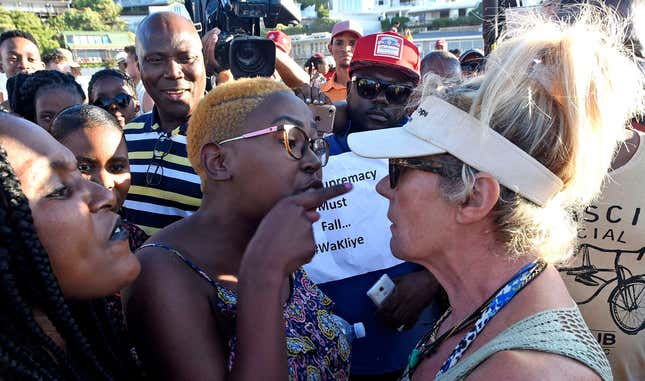When an unassuming sheep was led onto Cape Town’s Clifton beach, the animal became the latest character in South Africa’s annual seaside race row. Clifton’s beaches were once white only and today form part of some of the country’s most expensive real estate.
On New Year’s day, as Clifton’s mainly white middle class residents clear out to small towns and resorts, the city’s black population, still confined to the townships on the outskirts of Cape Town, use the public holiday to make the most of the icy water and expensive vista.
All over the country, the New Year is rung in with thousands of people trying to take advantage of South Africa’s 2,500 kilometers (nearly 1,600 miles) of coastline. It’s no different than in any other part of the world, but in South Africa throngs of diverse beachgoers carry the burden of a segregated past. Like every other part of life in South Africa, beaches were segregated under apartheid, the best kept for white people.
Yet, nearly 25 years after the end of apartheid sharing the beaches has erupted into isolated incidents of racism. These, like when a white estate agent infamously compared black beachgoers to monkeys, dominate social media and news headlines during the festive season, which unofficially ends over the first weekend of January.

The beaches are no longer segregated but their enjoyment is still limited to South Africa’s other great divider: the economy. It’s why going to Clifton is such an occasion. This year’s row revealed yet another dimension of South Africa’s racial divide: privatization. On Dec. 26, a private security company forcibly cleared people off Clifton’s fourth beach, a public area. It quickly became a racially charged issue.
The company was hired by business owners on the strip who claim crime has risen in the area. To anyone being shooed away from a public beach, this was seen as an attempt as the wealthy trying to privatize a public space. Like healthcare, education and housing, security has also been privatized in South Africa building even higher walls in an already divided country. Crime is already a public conversation tinged with racism in South Africa.
The premise for closing the beach was a serious crime though: two teenage girls had allegedly been raped in the area and the private security company had stepped in while waiting for police, said the company’s chief executive Alwyn Landman. It’s still unclear why they tried to close off the whole beach. The same security company was accused of closing off a popular road on New Year’s Eve, reportedly on the instruction of residents who didn’t want those outside their exclusive neighborhood using their view to ring in 2019.

In protest over the beach closure, a group calling itself the Black People’s National Crisis Committee staged a protest in which they slaughtered the sheep in a ritual to cleanse the beach of historic racism. That in turn led to friction over animal rights versus traditional beliefs, also a white versus black affair in South Africa.
Cape Town’s mayor, a member of the opposition Democratic Alliance (and a person of color), refused to concede that this was a racial incident. Members of political parties on the other side of the aisle, the African National Congress and the Economic Freedom Fighters, joined in the anti-racism protest that also happened to be taking place in an opposition stronghold, in an election year.
The festive season is over, but the tension is not. South Africa will continue to have these public rows because economic and social inequality continue to fall along racial lines. Hiring private companies to guard those lines will only deepen the divide.
Cape Town’s famous, pristine beaches that were once only accessible to white people are now accessible to people of all races since 1994.
The seafront, once a forbidden place, has now become a popular destination for thousands of black and Coloured people, along with their families. However, the behaviour and sheer volume of visitors often sparks grumbles and protests from the white community.
According to Maggie Devlin, a long-term resident of Sea Point, a popular beach area that is popular with black people, the current situation of sharing facilities is undesirable.
“I do not hold any prejudice or discrimination towards any particular race or ethnic group.I have no issue with their skin colour, whether they are black or brown. I can assure you that I am not prejudiced. However, their conduct is quite uncultured and unsophisticated. They swim in their undergarments, publicly change clothes, picnic and consume alcohol on the beach. They like playing loud music, spitting and urinating on the sand, and smoking marijuana. Moreover, their sheer number is intimidating and overwhelming.”
A different female, who is white, questioned the reason for the approval of “showing off in a pricey bikini” while it is not acceptable to swim in a bra and underwear
Ensuring equal access is a crucial concern.
In Cape peninsula, Coloreds make up for two-thirds of the population and controversially elected members for the new House of Representatives in the three-chamber Parliament last year. For them, equal access to public facilities is a crucial matter, making open beaches a significant indicator of the success of the new political system.
According to David Curry, the minister for local government in the Colored House of Representatives, it is unacceptable to be informed that we are not welcome on the beaches. The use of beaches is a sensitive topic for us. He expressed this sentiment at a recent Labor Party convention.
Furthermore, Botha has made recent commitments to implementing additional changes, such as initiatives to grant political representation to black citizens and enhance their quality of life. These pledges will be partially evaluated based on his endorsement of Cape Town’s efforts. Despite the government’s intention to maintain racial segregation in housing, it has also promised to promote integration in public facilities.
In addition, the National Party will be put to the test in their ability to ease the concerns of the 4.8 million white minority in a population of over 32 million, without resorting to strict apartheid policies.
Hopes for Success by Officials
To be honest, the manner in which they handled the situation has caused a lot of disturbance,” a junior Cabinet minister, who preferred to remain anonymous, expressed. “Although they have already gone through with it, it holds great significance for the country if they are able to achieve success…
For various intricate historical and demographic factors, I am of the opinion that a political structure centered on group rights is necessary. However, this does not imply that we should indefinitely maintain the social segregation that has existed thus far. My point is that achieving integration on the shores of Cape Town could facilitate integration in other regions and ultimately aid in our political progress.
However, the integration of beaches and the acceptance of it by white people continue to be a significant issue.
According to Joseph Boyle, a white schoolteacher, beaches have a certain intimacy that sets them apart from places like schools or restaurants. He observed a mix of black and white people at Sea Point and noted that white women do not appreciate being stared at by black individuals, nor do they want their husbands to look at attractive Colored or black girls.
‘Hidden Racial Bias in Individuals’
According to Jennifer Snullin, a Caucasian marketing professional, the concept of corporate racism allows individuals to absolve themselves of responsibility and claim they are unable to take action. However, while on the beach, many people come face to face with their own personal racism, regardless of their political beliefs.
Sheila McLennan, a Caucasian nurse, brought up a similar issue. She stated that many white people, including herself, have friends who are Colored or black. They socialize with them, invite them to their homes, and work together, but it is always on their own terms. However, in this setting, they are unable to dictate the terms and are forced to accept people as they are, which can be uncomfortable for many white individuals.
Agreement is reached by Allan Abrahamse, a government clerk of mixed race.
The issue with white individuals in this nation is that they are accepting of a few of us at a time and are even welcoming towards us,” he stated. “However, when they witness the increasing number of us, they become fearful, and when they see us receiving what was once exclusively theirs, some of them are overcome with panic. This is the root cause of all the commotion here.


Leave a Reply